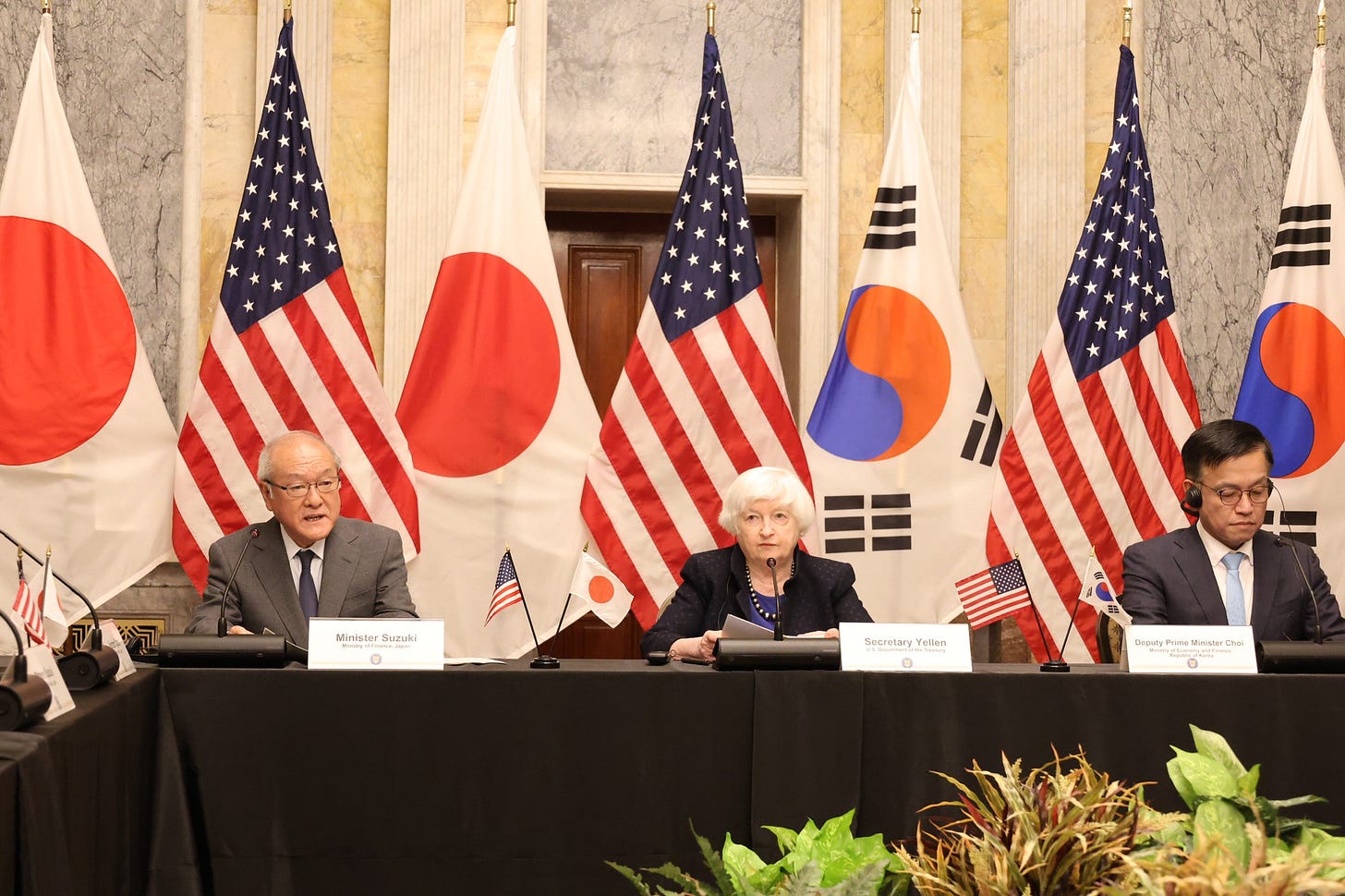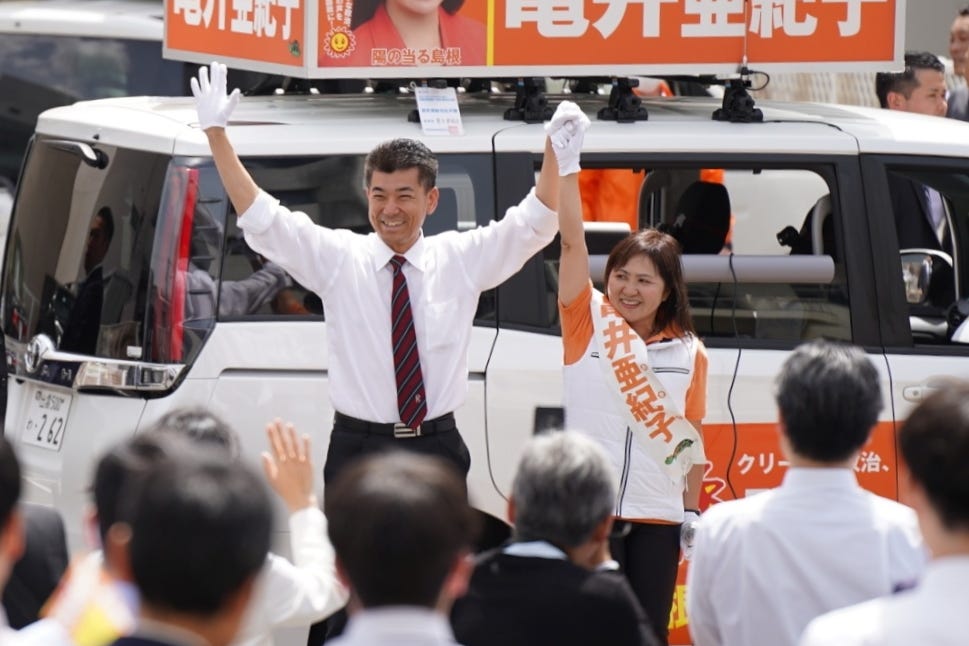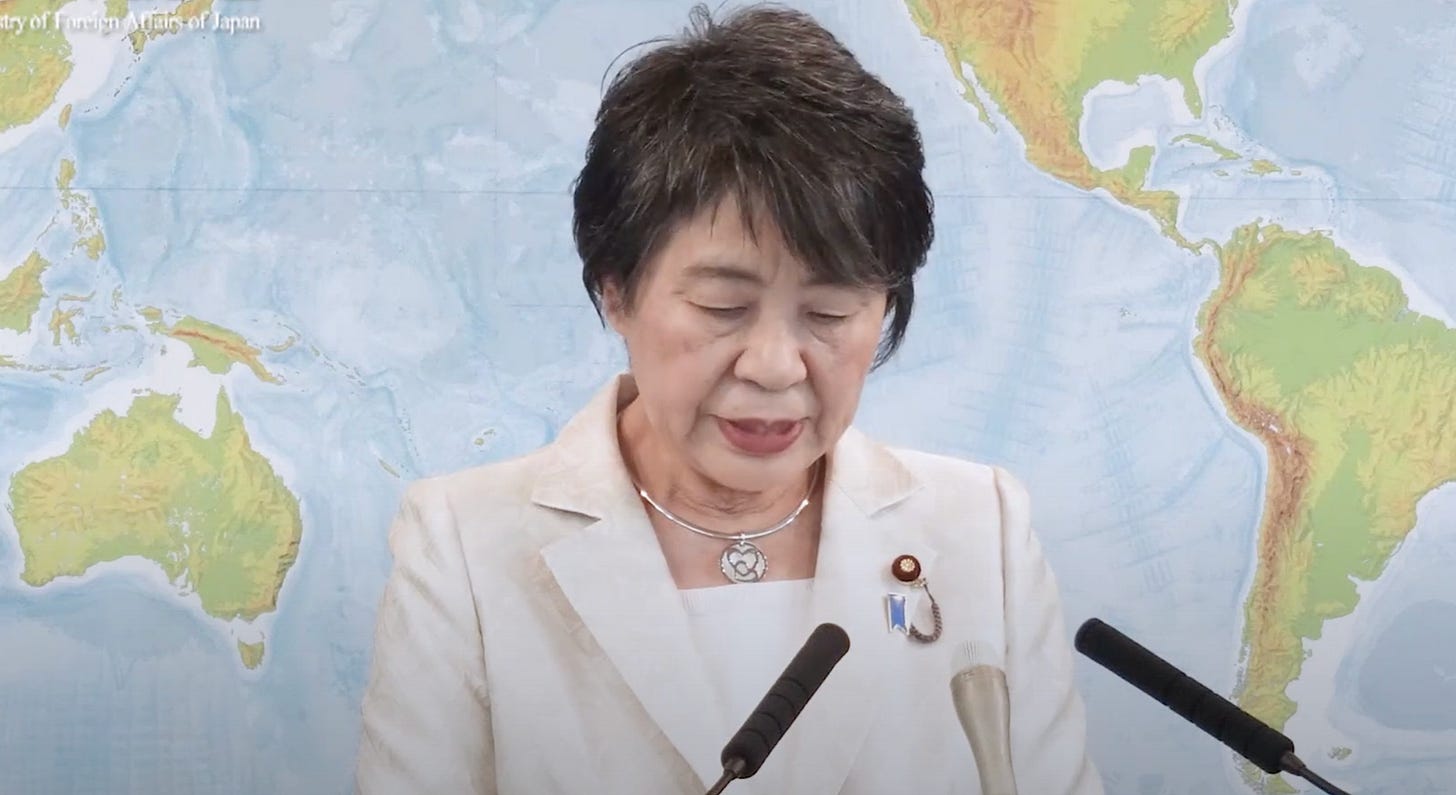Off to the races | This Week in Japanese Politics
The by-election campaigns begin, the CDP and Ishin spar, Ueda remarks on the yen, and Kishida makes plans for Golden Week.
The biggest story in Japanese politics is the start of the campaign for three by-elections on 28 April, which could determine whether Prime Minister Kishida Fumio will survive. Otherwise, another Liberal Democratic Party (LDP) faction dissolved, Ishin no Kai started its by-election campaign attacking the Constitutional Democrats, and the Shizuoka gubernatorial race takes shape. Meanwhile, with central bankers and finance ministers in Washington, the Japanese government expressed its concerns about the yen, and the lower house passed a big child support bill. Kishida will go to Latin America for Golden Week and Asō Tarō will go to the US to try to meet Donald Trump again. Plus: I ran the Boston Marathon this week and I’m feeling generous, so this edition will be free for all subscribers.
Politics
The campaigns for the Sunday, 28 April by-elections began on Tuesday, 16 April. The three races are in Shimane-1, which is the only race featuring a head-to-head clash between Liberal Democratic Party (LDP) and Constitutional Democratic Party (CDP) candidates; Nagasaki-3, which features a head-to-head race between the CDP and Ishin no Kai; and Tokyo-15, which includes nine candidates, including candidates from the CDP, Ishin, and a notable independent backed by Tokyo Governor Koike Yuriko who the LDP ultimately decided against endorsing. If the LDP loses in Shimane-1, it could accelerate efforts within the LDP to unseat Prime Minister Kishida Fumio.
Polling shows that the CDP could be positioned to win all three races. The Nikkei Shimbun reports that its polling shows CDP candidates in the lead in Shimane-1 and Tokyo-15; polling is not yet available for Nagasaki-3.
The LDP and Kōmeitō have begun consultations on the substance of political reform legislation that will be submitted to the Diet during the current session but there remain considerable gaps between the parties, let alone between the ruling parties and the opposition parties. Kōmeitō has drafted a proposal that includes greater obligations to report transfers from a politician’s support group to other groups; more transparency regarding the use of political funds; digitalization of records and external audits; and stricter penalties for violations. The LDP has still not drafted its own proposal, but may produce a more minimalistic plan along lines stressed by Kishida that bolsters penalties for lawmakers whose organizations break the law, upgrades external audits, and provides transparency through digitalization.
Constitutional Democratic Party (CDP) officials criticized the LDP on Thursday, 18 April for its timid approach to political reform, noting among other things the party’s unwillingness to close loopholes regarding which political expenses are reported. The CDP and Ishin no Kai have been discussing a joint reform proposal, but have struggled to reach an agreement, possibly because the two parties are also squaring off in the Nagasaki and Tokyo by-elections.
With Ishin no Kai facing the CDP in two races, party leader Baba Nobuyuki launched his party’s by-election campaign with a direct attack on the CDP. “Don’t vote for the CDP,” he said in Tokyo. CDP leader Izumi Kenta, stumping for his party in Shimane-1, said he was ignoring it. Izumi and other CDP leaders have stressed that they would prefer to have civil debates among opposition parties. Whether the CDP, the largest opposition party, and Ishin no Kai, which would like to supplant the CDP, can reach an understanding regarding their electoral strategies is a major question regarding the next general election. In the meantime, the CDP is pressing for victories in all three by-elections.
The LDP rejected former Abe faction chairman Shionoya Ryū’s request for a re-investigation into his disciplinary case. He will now have to decide whether to accept the punish – leaving the party voluntarily – or to continue to resist and be expelled.
The LDP also formally reprimanded party member Noda Seiko, who voted against legislation to change the civil code to allow joint custody for divorced parents despite party instructions to support it. Noda said that the legislation was “undercooked.”
The LDP’s Motegi faction, which along with the Asō faction was one of only two remaining, announced that it would dissolve as a political organization and transition to become a policy organization. The faction had been shedding high-profile members, diminishing faction leader Motegi Toshimitsu’s clout, and this move may come too late to preserve the group as the base for a possible leadership bid by Motegi in September.
Ruling and opposition parties have finalized their choices for the Shizuoka gubernatorial election that will be held on 26 May. The government is backing Ōmura Shinichi, a Ministry of Internal Affairs and Communications official who previously served a stint as vice-governor of Shizuoka; the CDP is backing Suzuki Yasutomo, who after serving five years as a Democratic Party of Japan member of the House of Representatives was mayor of Hamamatsu from 2007-2023.
Economics
At a meeting of G20 central bankers and finance ministers in Washington DC, Bank of Japan (BOJ) Governor Ueda Kazuo warned that if the yen’s decline accelerated, it could lead the BOJ to change its policies and raise interest rates more aggressively to curb the inflationary impact of higher import costs. Noguchi Asahi, a member of the BOJ’s policy board, delivered a similar message in Saga on Thursday, 18 April, but also said that the baseline scenario for interest rate hikes would be “quite slow.” Noguchi voted against the bank’s policy changes in March.

Finance Minister Suzuki Shunichi held a trilateral meeting on Wednesday, 17 April with US Treasury Secretary Janet Yellen and Korean Finance Minister Choi Sang Mok on the sidelines of the G20, where they agreed to coordinate closely on foreign exchange movements. The joint statement explicitly acknowledged Tokyo’s and Seoul’s “serious concerns” about their currencies’ weakness. (joint statement)
The government and opposition parties have been debating possible uses for the BOJ’s holdings of exchange-traded funds (ETFs), the market value of which is approximately JPY 70tn (USD 452.85bn). The Kishida government is considering the sale of a portion to fund its strategic investments in semiconductors; the CDP has proposed that dividend payments from the ETFs be used to fund a government plan to support childrearing (see below).
On Friday, 19 April, the House of Representatives passed a package of reforms proposed by the Kishida government to provide greater assistance to families with children and encourage families to have more children. The package will raise the maximum age for families to receive child allowances from 16 to 18, end means testing, and increase the benefit for third children; expand the parental leave benefits; and make childcare available to more families. The government plans to pay for the benefits by creating a fund supported by higher health insurance premiums from FY2026, which the opposition parties have complained will serve as a tax increase for older Japanese (hence the CDP proposal mentioned previously).
Foreign and security policy
As anticipated, the annual Ministry of Foreign Affairs “Bluebook” included language calling for a “mutually beneficial relationship based on common strategic interests” with China for the first time since 2019, a sign of the Kishida government’s interest in a possible thaw with Beijing. The Chinese government disregarded this language and hit back at other language it said exaggerated threats from China.
The prime minister’s official visit to the United States was the subject of considerable debate in the Diet this week, with lawmakers questioning the prime minister in particular about the new operational command structure that will be introduced by the US – and with some lawmakers taking offense to Kishida’s line from his address to Congress noting that he does not receive “such nice applause from the Japanese Diet.”
Kishida spoke with South Korean President Yoon Suk Yeol on 17 April to discuss the outcome of the official visit and the results of South Korea’s national assembly elections on 10 April, which went poorly for the president’s party.
LDP Vice President Asō Tarō will travel to the United States from 22-25 April to seek a meeting with former US president Donald Trump. Asō, who previously attempted to meet Trump in January, has been maneuvering to serve as a back channel with the once- and possibly future president of the United States.
Kishida will make his case for a “free and open international order with the rule of law” during a trip to South America during Japan’s Golden Week holidays in May. After attending a meeting of the Organization for Economic Cooperation and Development (OECD) in Paris on 2 May, where he will propose adding more Asian countries to the organization, he will travel to Brazil for meetings with President Lula Da Silva, whose country holds the G20 presidency and then to Paraguay for a summit with President Santiago Peña and a speech on Japan’s engagement with Central and South America.
After the United States vetoed a UN Security Council resolution that would have recognized Palestine as a UN member state, Chief Cabinet Secretary Hayashi Yoshimasa expressed the regrets of the Japanese government, which voted in favor of the resolution. “It is Japan’s recognition that Palestine fulfills the conditions of a UN member state,” he said.
Defense Minister Kihara Minoru is planning to travel to Hawaii from 2-5 May for a meeting with his US, Australian, and Filipino counterparts, building on progress in achieving in bilateral and multilateral settings between Japan and its partners in the region.
The House of Representatives passed legislation to establish the Self Defenses Forces Permanent Joint Headquarters (PJHQ), which will be led by an officer with the same rank as the heads of the SDF’s three services. All parties but the Japanese Communist Party (JCP) and the left-wing Reiwa Shinsengumi voted to approve the bill.
The Ministry of Defense reported that the number of aircraft scrambles in FY2023 fell for the second consecutive year, from 778 to 669. The number of scrambles against Chinese aircraft fell from 575 to 479.
Further reading
The Asahi Shimbun spoke with Yanagisawa Kyōji, a former defense ministry official who served as head of the National Institute for Defense Studies (NIDS) and an assistant chief cabinet secretary, about how Japan should think about the possibility of military and civilian casualties in the event of war.
LDP lawmakers are still adapting to life after factions.
But the factions have also retained some semblance of shadow existence.
New cover story in Toyo Keizai on the geoeconomics of semiconductors.
In an interview with Bloomberg, Tokyo Stock Exchange President and CEO Yamaji Hiromi refers to corporate governance reform as an “endless” process.
Thank you for reading “This Week in Japanese Politics.” If you are looking for timely, forward-looking analysis of the stories in Japans’s politics and policymaking that move markets, I have launched a new service through my business, Japan Foresight LLC. For more information about Japan Foresight’s services or for information on how to sign up for a trial, please visit our website or reach out to me.





